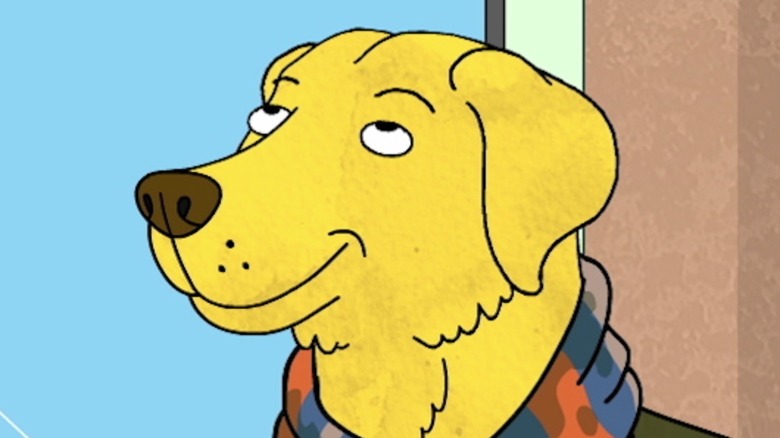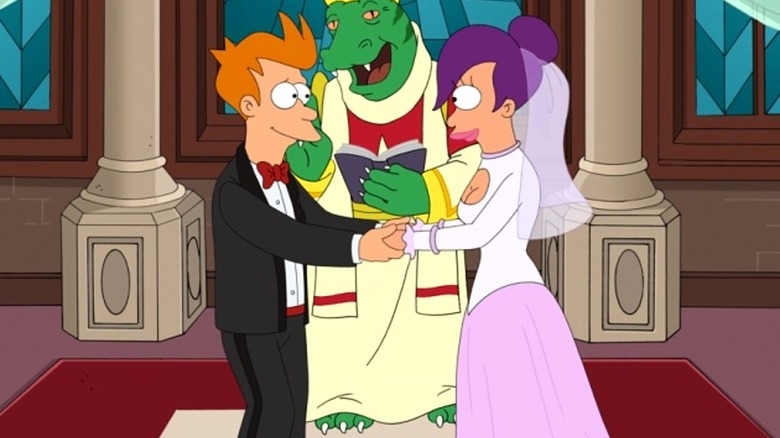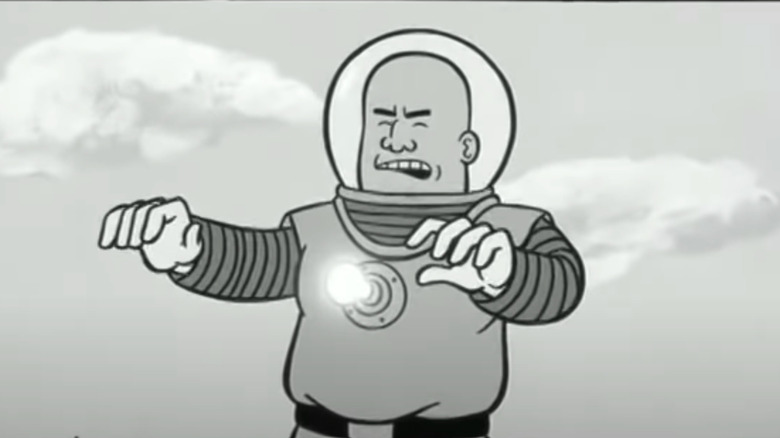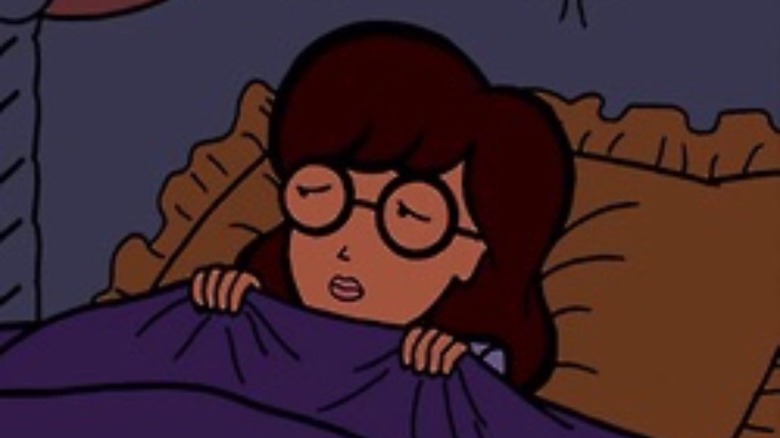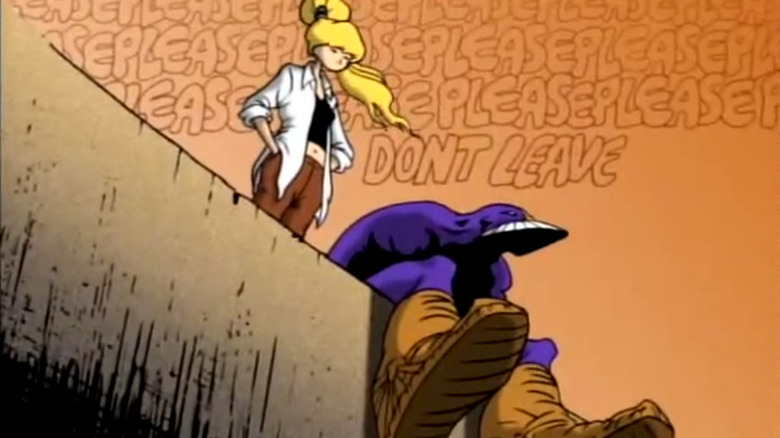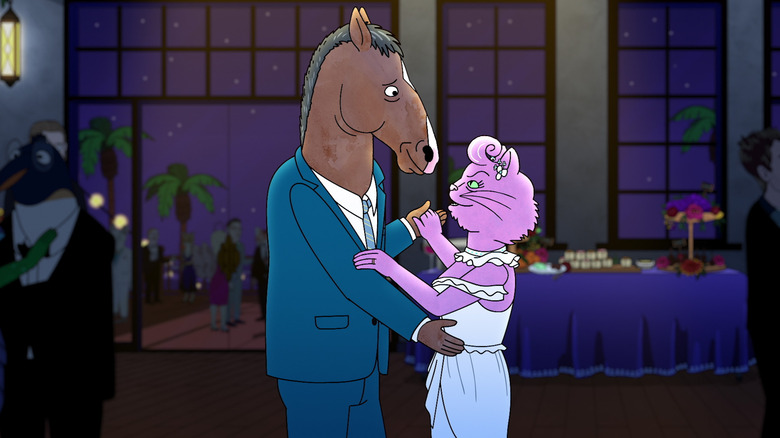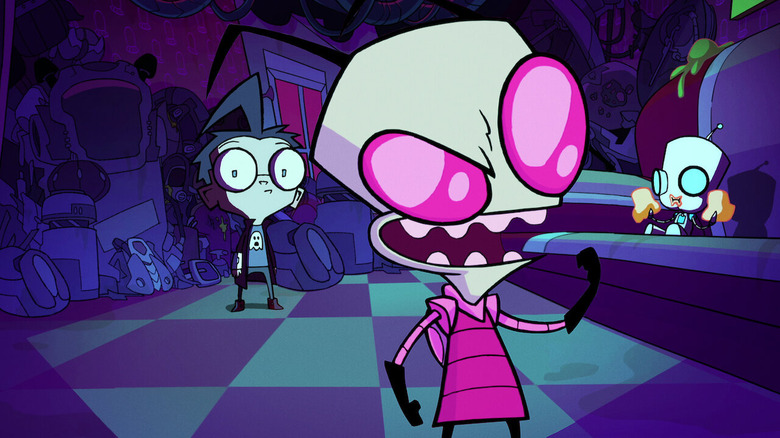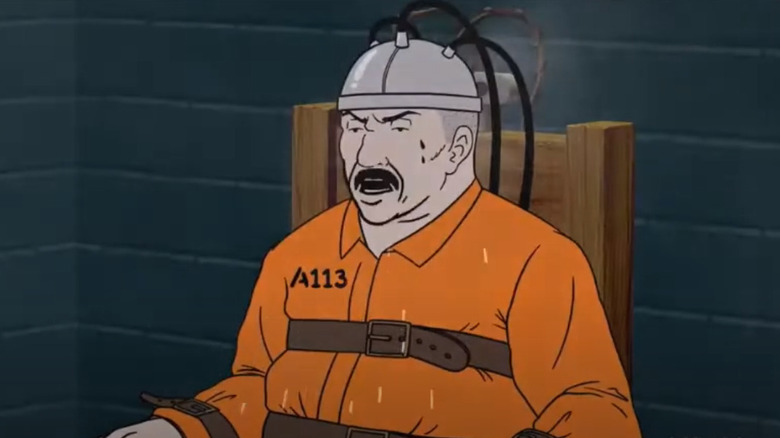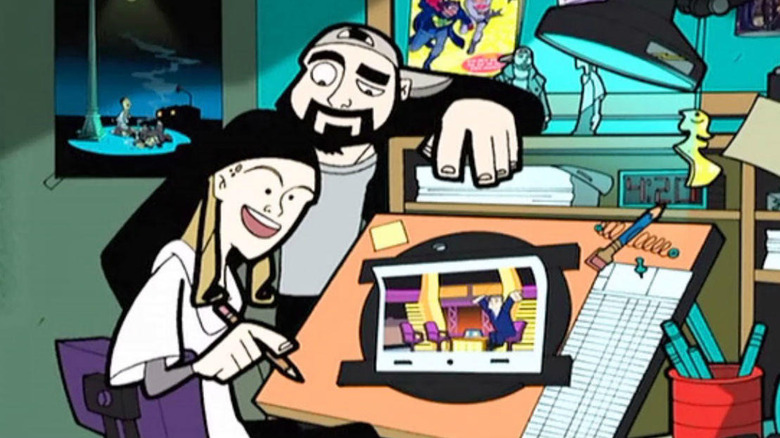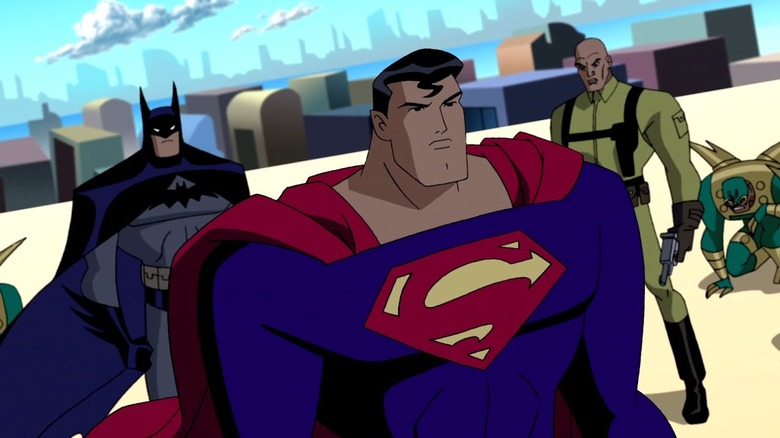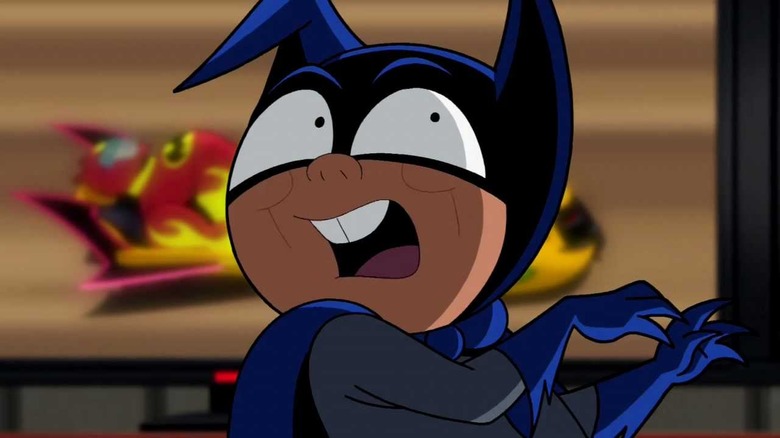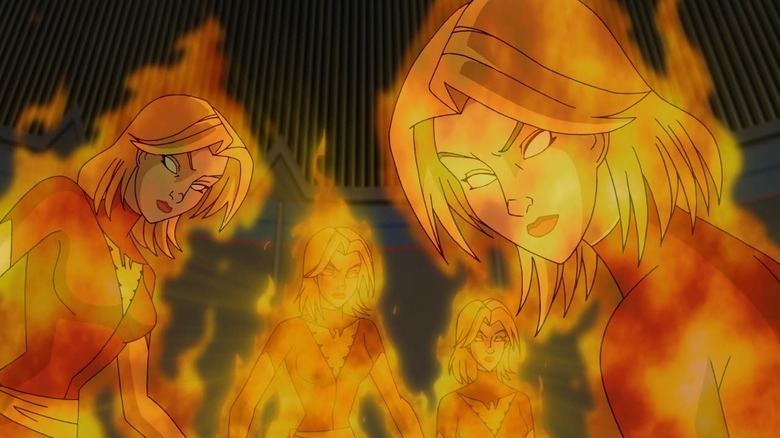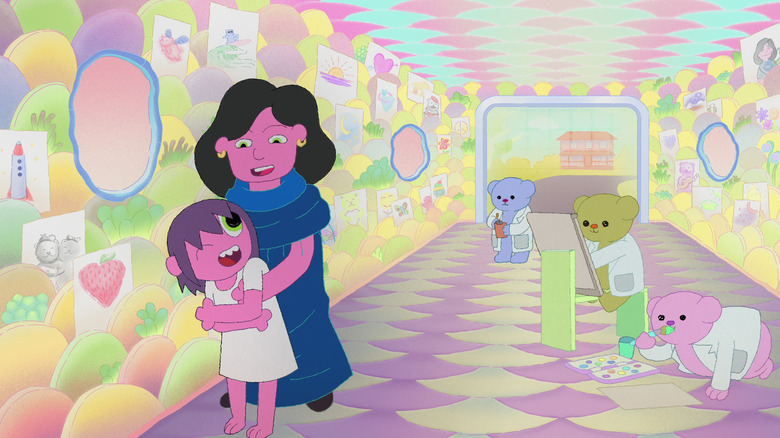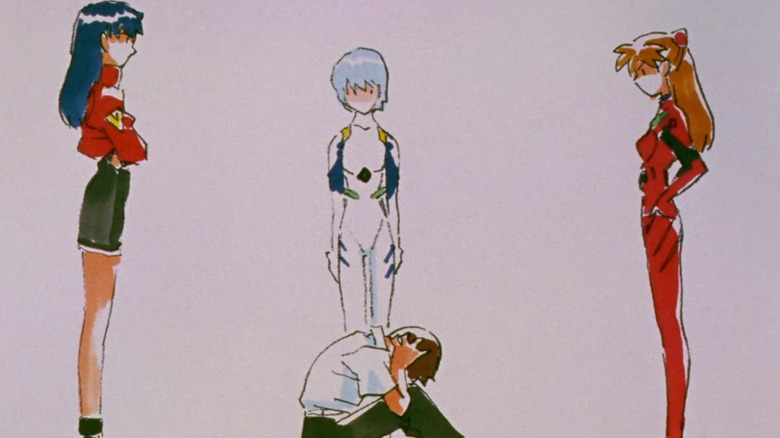The Greatest Cartoon TV Finales Ever
When we think of significant television finales, our minds tend to glide to influential programs like "The Sopranos," "Seinfeld," and "Lost." Those three examples do not share a genre, a network, or any of the same primary actors, but they have one important thing in common: None of them are made with drawings.
We don't talk about animated series' monumental finales all that often for a bunch of reasons. First and foremost, cartoons aren't taken as seriously in general. Animated characters can also stay the same age forever — nobody ever has to cast a new baby to play Tommy Pickles or Maggie Simpson — so there's not always a pressing reason to definitively end a still-profitable franchise. And for every "King of the Hill" or "Adventure Time" that gets to hang around for 10 seasons or more, there are a few cult classics like "Clone High" or "The Critic" that get canceled before a proper ending to their stories can be produced.
Today, however, let's throw normalcy in the dumpster and talk about the best TV cartoon finales of all time. These endings made us cry, made us laugh, and made us appreciate the medium in a new way.
Futurama
There are cartoons that were canceled too soon and cartoons that stuck around for at least a decade. "Futurama" fits into both categories, astoundingly enough. A rabid fanbase sustained the 31st century workplace comedy's existence on Fox for the better part of five years, but the network still gave "Futurama" the axe in 2003. On the strength of three straight-to-DVD movies and the franchise's continued popularity, Comedy Central eventually resurrected "Futurama," airing an additional 52 episodes before bringing another end to the misadventures of the Planet Express delivery service in 2013.
So basically, "Futurama" attracted a devoted following, never clicked with a broader audience, and was canceled twice by dubious network executives ... but "Futurama" also maintained a more-or-less constant presence in mass media for almost 15 years. "Futurama" is a disappointing failure and a runaway success, all at the same time!
Though another revival happened on Hulu, the saga came to another end with Season 7's "Meanwhile." In this finale, Fry bungles a romantic gesture and freezes time for everyone in the universe ... except Leela. The star-crossed lovers spend the rest of eternity together. Awwww. "Futurama" requires two things for a proper farewell, and "Meanwhile" has them both: A bucket of feels, and a decimated space-time continuum. See ya 'round, world of tomorrow.
Mission Hill
Shortly after "Mission Hill" premiered on The WB in 1999, the network underwent an identity crisis. Josh Weinstein and Bill Oakley's follow-up to their work on "The Simpsons" was instantly consumed by an opaque void of nothingness. Luckily, the urban slacker sitcom came along during an era in which reruns, home releases, and streaming can keep a humiliating ratings catastrophe (and creative triumph) lingering on the fringes of pop culture for more than 20 years.
Notably, unlike other '90s comedies that attempt to incorporate LGBT themes and characters — looking at you, "Chasing Amy" and "Homer's Phobia" — "Mission Hill" centers a gay love story that lacks stereotypes or patronization in Episode 13, its final installment. "Plan 9 From Mission Hill (or I Married a Gay Man from Outer Space)" is also loaded with film nerd references, as the cinephiles among you might guess. Excluding the rental store-oriented humor, the movie buff gags have aged remarkably well. Happily, Gus and Wally, the couple at the center of "Plan 9," could be on their way back to television (via Deadline). However, as far as we can tell, "Mission Hill" itself remains appropriately stuck in the '90s.
Daria
"Boxing Daria" is the final 22-minute installment of "Daria," MTV's essential teen anti-melodrama. But the eponymous character and her frenemies at Lawndale High keep doing stuff through the 2002 TV film, "Is It College Yet?" Perhaps the murky status of "Boxing Daria," as far as its claim to being the official "Daria" series finale is concerned, can be debated. But if co-creator Glenn Eichler says it's a series finale, who's to argue? "It was [a] good way to button up the series," Eichler told The Nerdist in a 2019 retrospective. "Like the movie ended the series, but so did that episode."
Self-analysis is terrifying for people who live in the live-action world. When it doesn't roll over into Deadpool-style fourth wall breakage, it can be just as uncomfortable for cartoon folks. From her debut as part of the supporting cast of "Beavis and Butthead" in 1993 all the way to her 1997 spinoff series and beyond, Daria Morgendorffer establishes a personal brand by accurately pointing out the faults of individuals in her orbit. In "Boxing Daria," resurfaced childhood trauma forces her to deal with her own flaws — specifically, the potentially hidden consequences of her ceaseless irreverence. All that snark is great for giving those of us in the audience a chuckle, but it doesn't necessarily make life easier for Daria's parents. That fact comes to the fore in this introspective ending.
The Maxx
"The Maxx" is not generally lauded as a groundbreaking work of power fantasy deconstruction, though it deserves to be. This is especially true for the 1993 comic's first 12 issues, which underwent a 13-episode television adaptation in the form of MTV's 1995 series, "The Maxx."
Superhero tales almost always conclude with a heap of bombastic action and the Earth itself squirming in peril. Contrastingly, the stakes at the end of "The Maxx" are almost entirely emotional. Freelance social worker Julie Winters and the eponymous purple and yellow crusader of justice have become aware of their supernatural codependence. Therefore, they must part ways and learn who they are when their subconscious minds aren't immersed in each other's damage.
It's intense stuff. Also, Maxx squishes the severed head of proto-incel Mr. Gone. That sounds like a big deal, except Gone's head hasn't been attached to his body since Episode 3.
BoJack Horseman
"BoJack Horseman," undoubtedly one of the best things Netflix has ever produced, comes to a surprisingly understated conclusion with "Nice While it Lasted," rounding out the otherwise dark and unrelenting second half of Season 6.
In this thoughtful finale, BoJack gets a temporary release from his 14-month stint in maximum security prison to attend Princess Carolyn's industry wedding. Mr. Peanutbutter attempts to replace the "D" from the Hollywood sign he took credit for stealing in Season 1, but the giant letter manufacturer mishears his instructions and the sign ends up reading "Hollywoob." Todd provides fresh philosophical analysis regarding the Hokey Pokey. After all that (and more), "BoJack" bids us farewell with a crushing, if hopeful, rooftop exchange between Diane and the titular horse that's got to be among Alison Brie and Will Arnett's career-best performances.
"Thank you, and ... it's going to be okay," Diane tells the troubled actor, during what might be their last conversation ever. "And ... I'm sorry, and thank you." No, Diane, we're sorry, and thank you, you marvelous imaginary person whose occasional company we have so richly enjoyed.
Invader Zim
If you were a child hoping to enjoy a quality sci-fi/horror/comedy program during the early '00s — and really, who wasn't? — "Invader Zim" was just about your only option. But did the corporate overlords at Nickelodeon allow the crew behind "Zim" the dignity of finishing a planned Season 2? You bet your bottom they did not, and "Zim" ceased production in 2002. This did not stop it from becoming one of the most enduring alternative icons of the '00s — any given Hot Topic basically acted as a Zim outlet circa 2006.
Technically, based on their zany original broadcast order, there are two episodes that could count as series finales. But they both feel like incidental, inconclusive endings to the "Invader Zim" saga. Meanwhile, "Enter the Florpus," the 2019 Netflix film, feels like a purposeful, deliberate sign off. It's approximately 100 minutes of insane delight, chronicling Phase 2 of Zim's evil plan, the ghastly execution of meddling kid Dib Membrane, and Zim's ascension to his rightful station as god-king-emperor of Earth.
We made the word "could" do an awful lot of work just now, but we're trying to stay light on spoilers. We can say more concretely that "Enter the Florpus" uses puppets to warp reality. And for a few scenes, Justin Roiland of "Rick and Morty" fame lends his million-dollar pipes to the Foodio 3000 — a robot who prepares and serves food. Bottom line: It's pretty much perfect.
Aqua Teen Hunger Force
Possibly anticipating their looming cancelation on a subconscious level, the Aqua Teens scheme to turn immortal in the finale to Adult Swim's most relevant series of the 2000s. Frylock and Carl use enchanted shampoo, which works, whereas Meatwad and Master Shake devote themselves to religion, which does not.
Because ending "Aqua Teen Hunger Force" with anything except unpredictable blasts of psychotic violence would be the stupidest thing ever, the core Aqua Teen crew, accompanied by several supporting characters (including the Mooninites, Plutonians Oglethorpe and Emory, and the Cybernetic Ghost of Christmas Past from the Future), all evaporate in a cloud of blood and entrails upon encountering a hail of police bullets. Frylock and Carl survive, due to the aforementioned hair cleaning product. Meatwad also makes it out, because of course he does.
The mad-libs-style storytelling of the program that, after a few prior re-brandings, became known as "Aqua Teen Forever" in its final season, does not remotely lend itself to long term story development. The mere facts that "Aqua Teen" launched in 2000, held itself together long after its '00s zenith of popularity, and managed to produce a somewhat coherent bookend is, ah ... well, it sure is something. The fact that it got a revival eight years later continues to be shocking.
Clerks: The Animated Series
ABC only aired two installments of "Clerks: The Animated Series" in 2000, and did so in an out-of-continuity order that rendered many self-referential, serialization-based gags totally incomprehensible. So nobody could form much of an opinion about this version of the "Clerks" gang — until the cartoon series hit DVD in 2001. At that point, many fans observed that as far as its tone and style of humor go, "Clerks: TAS" has way more in common with "Family Guy" than its source material.
Correctly anticipating some backlash from sore film nerds, "Clerks: TAS" begins its final finished installment with Dante promising the audience that what follows will go "back to its roots," with "nothin' but old school 'Clerks.'" Dante and Randal do, in fact, spend most of the remaining 20-somsething minutes inside the Quick Stop, yet they find themselves menaced by a "Matrix" parody, a catastrophic Ferris wheel malfunction, and the Brazilian men's soccer team.
Justice League Unlimited
Thanks to direct-to-DVD movies, video games, and guest appearances on a subsequent Batman show, "Destroyer" didn't turn out to be Kevin Conroy's final turn as Batman, George Newbern's last time voicing Superman, or Clancy Brown's curtain call as Lex Luthor. But if "Destroyer" stands as a kind of "in spirit" retirement of at least three era-defining iterations of their respective characters, it's about as close as a Cartoon Network show from 2006 can hope to get to 2017's "Logan."
In its finale, "Justice League Unlimited" ties up all its loose ends when its multitude of heroes call a temporary truce with the diabolical Legion of Doom, so that all of Earth's superpowered folks might unite to smash Darkseid's invading army. A heck of a lot of punching and kicking happens. A heck of a lot of zapping happens. And if you doubt the rock-solid epicness of this episode, observe that "Destroyer" culminates in Superman's "world of cardboard" speech — the DC Animated Universe's answer to the Pandorica rant from "Doctor Who." Doesn't every truly great hero need a signature monologue?
Batman: The Brave and The Bold
If anyone could take Deadpool's fourth-wall-breaking meta shtick and do it as well (or better) than the Merc with a Mouth — all without the crutch of an R rating — of course it would be Batman. In the finale to "Batman: The Brave and the Bold," Bat-Mite, a pain in the butt from the fifth dimension, decides the cartoon is past its prime and must end to make room for a grittier Batman production. Ergo, he uses his reality-warping powers to turn "Batman: TBATB" crummy by incorporating, among other things, gratuitous product placement. Cue the Neon Talking Super Street Batluge toy, which companies hope will be a top seller.
Bat-Mite's plan ultimately succeeds ... almost. The network suits decide to produce a dark Batgirl show instead. Oh, and did we mention this episode starts with Batman joining forces with Abraham Lincoln to beat the living snot out of John Wilkes Booth? Did Bruce Timm or Paul Dini ever include anything as awesome as that in their '90s Batman show — the one we all keep saying is the superhero cartoon G.O.A.T.? No, they did not.
Wolverine and the X-Men
Considering how significant the X-Men are to animated superhero media, the fact that their television presence has been limited to live-action in recent years boggles the mind. Even crazier is the fact that Hollywood has adapted "The Dark Phoenix Saga" twice and bungled both projects. Meanwhile, excellent versions of the same quintessential mutant odyssey have been delivered by two cartoons. The '90s "X-Men" series breaks Jean Grey's intergalactic rise and fall into a nine-parter, while 2009's brutally short-lived "Wolverine and the X-Men" mixes in elements of Grant Morrison's "New X-Men" comics from the early '00s.
The single-season "Wolverine and the X-Men" hits its boiling point in the three-part finale, "Foresight." It's got the hyper-concentrated fan service of multiple acclaimed eras of X-Men comics merged into one story, for one thing. But beyond that, "Foresight, Part III" ties off an overflowing fistful of arcs with an elegance uncharacteristic of superhero animation. To give you an idea of how convoluted this show could have gotten in unskilled hands, time travel factors heavily into the macro-arc of all 26 episodes.
If any Disney+ executives are reading this, we feel it's worth saying that If HBO can bring back "Young Justice," Disney can bring back "Wolverine and the X-Men." We were led to expect a Season 2 set in the Age of Apocalypse, dagnabbit!
The Midnight Gospel
Podcaster-comedian Duncan Trussell pooled creative energies with "Adventure Time" creator Pendleton Ward for Netflix's "The Midnight Gospel," an exquisite work of magic and wonder soaked in heavy psychedelia. To the great distress of many who found the program's oddly comforting explorations of terrifying existential matters helpful for keeping spirits elevated during the 2020 pandemic, "The Midnight Gospel" has yet to be confirmed for a second season.
The show's visual component tends to follow a steam of consciousness all its own, while its interviews are repurposed from episodes of "The Duncan Trussell Family Hour." Time-and-space hopping protagonist Clancy — voiced by Trussell — enters a simulator that brings him into contact with shape-shifting avatars of guests from pre-existing podcast episodes. In the de facto finale, "Mouse of Silver," Clancy encounters his mother, voiced by Trussell's real-life mom, Deneen Fendig. Before long, we find out Clancy's mom, and by extension Trussell's mom, passed away shortly after recording the podcast episode that eventually became this cartoon.
Luckily for the audience, "The Midnight Gospel" offers a unique perspective on mortality that eschews Pollyanna-ism and morbidity. "My guru says everything's perfect," Trussell told Polygon in an in-depth 2020 article. "The thing that ... we were trying to get across in that episode is that [everything] is perfect. It is beautiful. But it can also be catastrophic simultaneously. And maybe a human life is just going between those channels."
Neon Genesis Evangelion
If any series that resides under the definitional umbrella of "anime" transcends its category, "Neon Genesis Evangelion" is that series. Ergo, even though this isn't an anime list, the haunting introspective nightmare that is the series' final episode, "The Beast That Shouted 'I' at the Heart of the World," warrants a slot here.
Drifting in the thrall of the Human Instrumentality Project, mecha-pilot (and terrified teenager) Shinji Ikari must chose between an existence full of individual beings experiencing their own joys and sorrows, or one in which all mankind is unified into a single humungous consciousness.
After its original broadcast in 1996, the "Evangelion" fanbase demanded a less abstract conclusion. 1997's "The End of Evangelion" ensued. This movie depicts the spectacular and completely awful events that the television version only shows in brief flashes, or alludes to via metaphor. It has definitely made more than one viewer use the bathroom in his or her own pants. If we have to choose, we'll take the breezy, lightly comical version of the apocalypse "Evangelion" put on television. Thanks, and congratulations!
